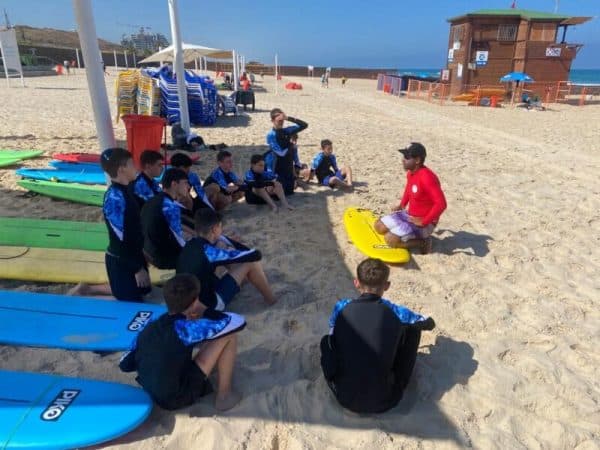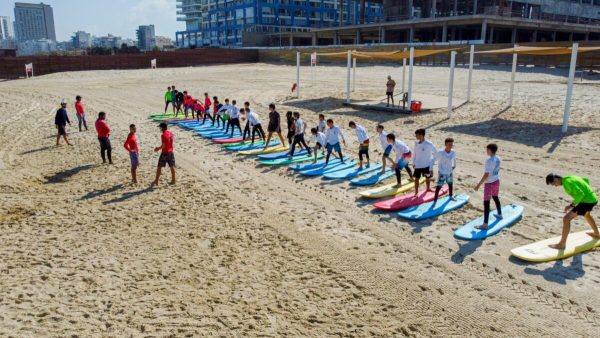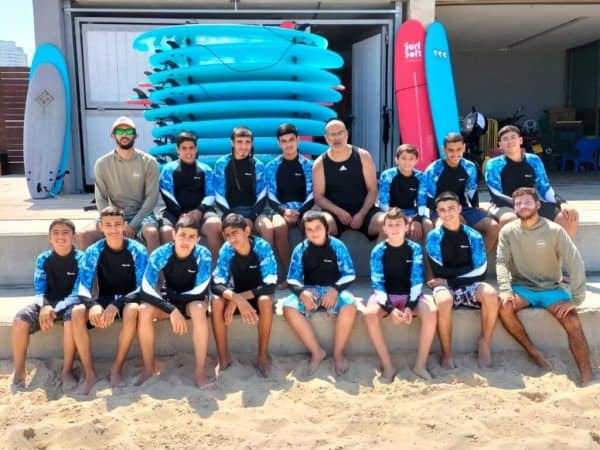Riding the ‘Waves of Hope’: Surfer champion-turned-Haredi helps at-risk religious kids navigate life’s choppy waters
April 19, 2024 – Judith Sudilovsky,
Eliyahu Ben Zion, who became religious at 19, provides surfing class to 1,500 at-risk youth from Haredi and other religious backgrounds each year

The waves were a bit strong and the breeze still chilly, on the official opening day of the Shirat HaYam gender-segregated beach in Bat Yam, Israel, last week as Waves of Hope began the first lesson of its therapeutic surfing course for a new group of at-risk girls from the Haredi community.
Exhilarated from her first foray into the sea with a surfboard, Elisheva David, 17, from the mainly Haredi city of Elad, was still wearing a wetsuit while a few of the other girls had already changed into their ankle-length skirts and long-sleeved shirts.
“I was afraid I would be cold, and that I would get water in my eyes, or that I would be stiff afterwards,” said David, who had come to the course for the first time at the suggestion of Elad’s educational and youth counselor, Odelia Levi. “It was freezing, but I am proud of myself. I for sure will come back next week.”
For Eliyahu Ben Zion, founder and director of the nonprofit, those words make his efforts worthwhile.
A former Israeli surfing champion who became religious when he was 19, Ben Zion brought the sport of surfing into the world of religious at-risk youth to help change the course of their lives. His goal now, he said, is to “return them to the path of being human.”
While using sea sports as a tool to help treat such youth is a widely used therapeutic form of treatment worldwide, the Waves of Hope program specifically for at-risk religious youth is the only one of its kind in the world, said Ben Zion, 46. Every year the nonprofit provides classes to 1,500 at-risk youth. All participants must already know how to swim.

Ben Zion initiated the program that eventually grew into Waves of Hope in 2016 when the mayor of Elad approached him with the idea of using surfing to help a group of 10 at-risk boys. Knowing the surfing world from up close since he was 6, Ben Zion said he was initially hesitant to introduce it into the religious community. But then as he created the specially tailored therapeutic program for the disaffected youth who left school and the community, he saw it as a unique way of helping these young people.
“In a classroom setting they can be troublemakers, but when they come to the sea they are really afraid. They feel the danger so I take advantage of that and can keep them on a tight leash and they have set limits. They need limits to bring them to a place where they can surf,” he said.
The religious community is no different than the rest of the population in terms of the problems youth are struggling with, he said, whether their disengagement stems from a history of academic failure, abuse, family crisis or spiritual alienation. At-risk youth from observant Jewish families, who have stepped out of their social framework, can be especially vulnerable because they often face hostility and exclusion from their families and community who regard them as rebellious, defiant or as a disgrace.
“Most of these at-risk kids go to sleep at 3 a.m. and wake up at noon,” he said. “I make it a point that they have to come on time to the course at 10 a.m. This requires them to change habits.”
Sometimes he even arranges for individual lessons at 5 a.m. to help build their self-discipline.
Facing challenges in the sea also helps them learn how to cope with obstacles and problems in their daily lives, he said. A social worker is always present during the classes.
Levi noted that she is in contact with the girls whom she recommends for the surfing course through the welfare office of Elad. The course exposes the girls to a set of experiences usually unknown in the Haredi world, she said.
“It exposes them to different places. They discover within the sea that they can succeed. Through the sea they see there are good things in the world,” said Levi. “You see the joy they experience. All these experiences go with them and give them inner strength, the sense that ‘I did something, I succeeded.’ Even if they don’t succeed, they were here, they came to the course and feel that if they want to succeed, it is all a matter of practice and effort.”

As long as he rustles up enough funding, Ben Zion says he is able to open a 10-session course for a new group of 14 youth — separate for boys and girls. It costs NIS 25,000 ($6,600) to open a course, he said, and the nonprofit receives funds from religious municipalities as well as private donations. There is always a waiting list, he added.
Recently the Good People Fund provided Waves of Hope with a matching grant for a new class of girls from the southern towns of Ofakim and Netivot who have experienced war-related trauma from the Oct. 7 Hamas attack, and he is working to raise his end of the funding. It is the second year the fund has supported the program.
“Clearly we fund organizations, but we also focus on the founder, and that was really what drew us in,” said Naomi Eisenberger, executive director of the Good People Fund. “Our focus is on individuals who have found creative ways to solve problems. Using surfing is a very creative way of dealing with the issue of at-risk youth in the religious community. And Eliyahu’s path to doing this is itself a very interesting path, he was a champion surfer before he became religious and he is clearly very passionate and committed to this work as is his wife. He is charming and he is very committed to these kids. He represents for us individuals who have found creative ways to do tikkun olam with this pretty unusual program.”
For modesty reasons, Ben Zion does not normally oversee the classes for the girls, but his wife, Katty — who said that while all nine of their children have learned how to surf, she only does “a little surfing” — is present, working out of their cramped storage room/office to help the girls who might be hesitant to take the surfing plunge. On one recent morning, for instance, there had been a mini-crisis with David, and Katty had to negotiate with her to give the lesson a try.
“Afterwards she felt like she had succeeded, and like she was worth something,” Katty said.
Those who excel in the course are sent to Wingate Institute for sports excellence, for certification as surfing instructors; they can later be employed by Waves of Hope as instructors for their private classes, which are available to the general public — both religious and secular — and their summer camps, also for the general public. Revenues from both go to pay salaries for the instructors and also help fund the at-risk youth program. Any graduate of the program can also come to surf with Waves of Hope on Fridays when they are open.
Esther Malka Nusbacher, 21, from Beit Shemesh, has been teaching the course for the girls for four years. She first took surfing lessons as a private student in the summer camp. Ben Zion saw her potential, sent her to Wingate and then employed her as a counselor for the girls program.
“Just getting to the sea is for them freedom and they enjoy that and get into the water. It is just simply something else. You come, you surf and you feel like you belong to something. When they succeed you simply see their joy on their faces,” said Nusbacher. “They learn and they succeed. Here we are, the first lesson for these girls and they are present and laughing.”
Some of their students return to their yeshiva studies or to their midrasha, Ben Zion said, while others he helps get drafted into the IDF or start working. Graduates have also gotten married and started families of their own, said Ben Zion.
“They always stay in touch after the course,” said Ben Zion. “Today they stand as human beings.”




